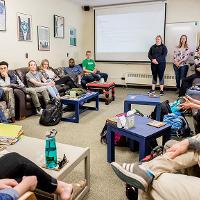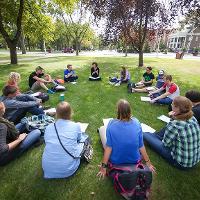What is Honors?
The Honors Program serves motivated, accomplished students by nurturing creativity, critical thinking and scholarship beyond the usual academic frameworks.
Through classes, co-curricular activities, service projects and advisement, the Honors Program creates a learning community that emphasizes intellectual exploration.
Mission Statement
Gathering engaged faculty and students from across campus, the UND Honors Program creates a holistic, multidisciplinary, student-centered educational experience that prepares the next generation of citizen-scholars from today's exceptional students.
Vision Statement
The Honors Program will cultivate the next generation of justice-oriented, critical, curious, and creative thinkers and leaders with the knowledge, skills, abilities and commitment to have a positive impact on the world around them.
Diversity, Inclusivity, and Equity Statement
The UND Honors Program intentionally infuses the values of diversity, inclusion, and social equity into its curriculum, programming, and faculty/staff training. We promote mutual respect and attentiveness to our common human dignity while also highlighting the educative importance of recognizing differences in identities, cultural and ethnic backgrounds, and ways of learning and knowing.
Prepare for the Future
Choose the experience that sets you apart.
Combine your love of learning with your desire to make a positive impact on the world around you. The UND Honors Program:
- Complements any major, seamlessly integrating into your academic journey to enhance your overall experience.
- Provides small classes meant to stimulate your curiosity and provoke thoughtful discussion about the world and its diverse peoples and cultures.
- Offers classes specifically designed to support you while you volunteer in the community, complete an internship or perform research with a professor of your choosing.
Close-Knit Community
Honors Classes
On average, we offer 35 Honors classes per semester. Level up your field of study and take advantage of electives, like our Conspiracy Theories, Science & Fiction and Medical Humanities classes.
Faculty Mentoring
You’ll work closely with award-winning faculty who are as passionate about teaching as you are about learning. They’ll connect with you one-on-one and support you in achieving your goals.
Living Learning Community
If you live in the Honors Living Learning Community, you’ll get to know your classmates as your roommates. The Honors LLC regularly hosts vibrant intellectual discussions, film screenings, trivia nights, scavenger hunts and other celebrations for high-achieving students.
Active Learning
Earn 24 Honors credits by completing these simple, flexible requirements and graduate with an Honors distinction.
- Take your first Honors class:
- HON 101: The Human Experience or
- HON 102: The Leadership Experience.
- Next, choose from a variety of unique Honors courses to help you become a more well-rounded student and fulfill some of your general education requirements. Options include the HON 260: Honors Experiences, where you can volunteer in your community, complete an internship or work on research with a faculty member.
- Finish the Honors Program with your Senior Honors Project, where you get to work on an independent project or paper you design with the supervision of an expert professor.
- Graduate with Honors on your transcript and diploma and a pink Honors cord to indicate your accomplishments!
What are Honors students like?
Honors students have personalities and interests as diverse as the rest of the student body. Some major in professional fields such as engineering, aviation, computer science and pre-law, while others major in fields such as psychology, languages, philosophy, music, arts, history, political science, management, and more.
As the common denominator, members of the Honors Program tend to be genuinely and deeply interested in ideas. They read widely, like to communicate ideas, are curious and excited about a wide range of subjects, and are committed to intellectual exploration. Students often form lasting friendships with other Honors students across disciplines and interests.
The classroom remains the most radical space of possibility in the academy.bell hooks






